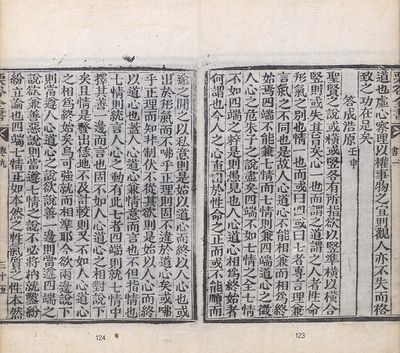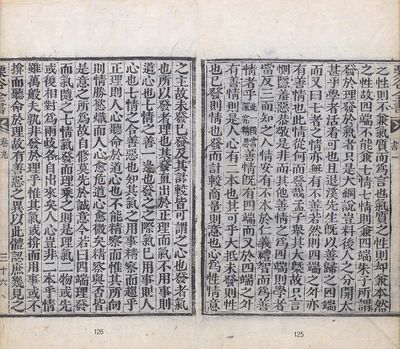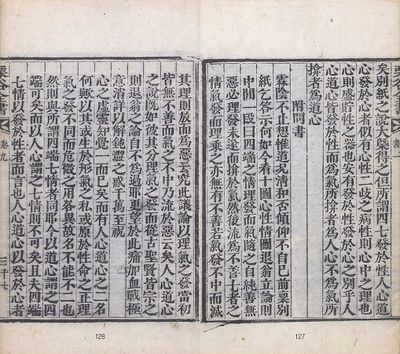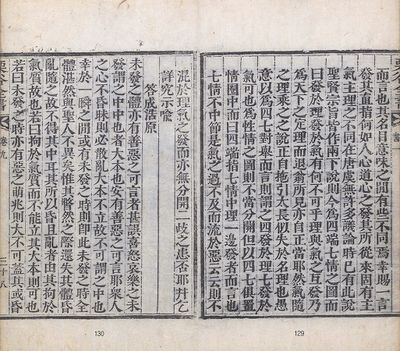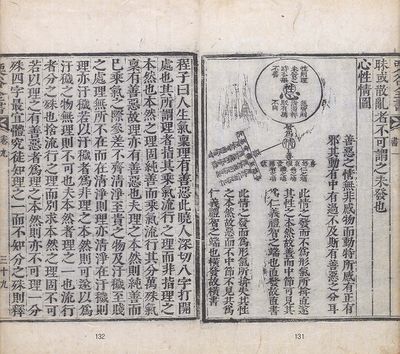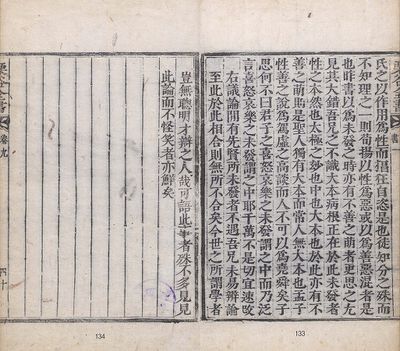(Translation) 李珥 答成浩原(壬申)
| Primary Source | ||
|---|---|---|
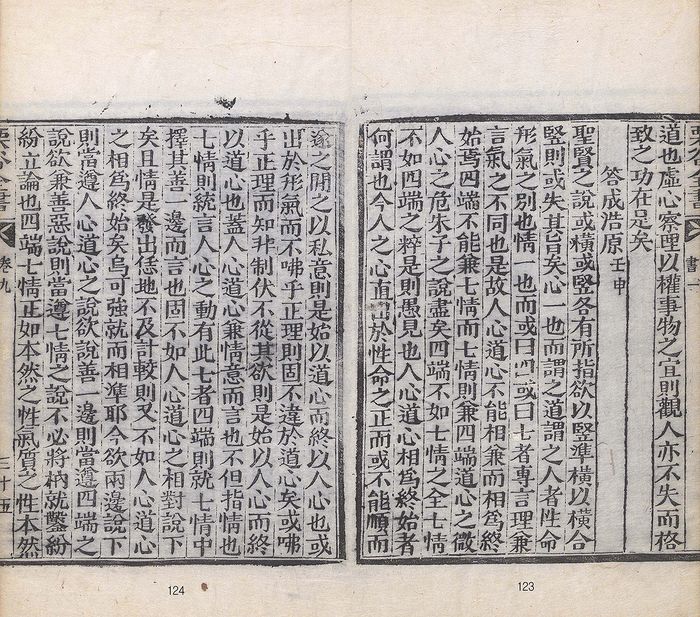 |
Title | |
| English | ||
| Chinese | 李珥 答 成浩原(壬申) | |
| Korean(RR) | 이이 답 성호원(임신)(Yi I Dap SeongHowon(Imsin)) | |
| Text Details | ||
| Genre | Literati Writings | |
| Type | Letter | |
| Author(s) | 李珥 | |
| Year | 1572 | |
| Source | IMG. Korean National Assembly Library (국회전자도서관)
TXT. Korean Classics and Literati's Collection of Writings (한국고전종합DB) | |
| Key Concepts | ||
| Translation Info | ||
| Translator(s) | Participants of 2019 JSG Summer Hanmun Workshop (Advanced Translation Group) | |
| Editor(s) | ||
| Year | 2019 | |
목차
- 1 Introduction
- 2 Original Script
- 3 Discussion Questions
- 4 Further Readings
- 5 References
- 6 Translation
- 6.1 (sample) : Jaeyoon Song
- 6.2 Student 1 : Yishu Ma
- 6.3 Student 2 : Samuel Sai Hay Chan 陳世熙 진세희
- 6.4 Student 3 : Younès M'Ghari
- 6.5 Student 4 : King Kwong Wong
- 6.6 Student 5 : 신동조
- 6.7 Student 6 : Stacey Lui
- 6.8 Student 7 : (Write your name)
- 6.9 Student 8 : Q
- 6.10 Student 9 : (Write your name)
- 6.11 Student 10 : Yeonjae Ra
- 6.12 Student 11 : (Write your name)
- 6.13 Student 12 : (Write your name)
- 6.14 Student 13 : (Write your name)
- 6.15 Student 14 : (Write your name)
Introduction
Original Script
Discussion Questions
Further Readings
References
Translation
(sample) : Jaeyoon Song
- Discussion Questions:
Student 1 : Yishu Ma
- Discussion Questions:
聖賢之說。或橫或豎。各有所指。欲以豎準橫。以橫合豎。則或失其旨矣。心一也而謂之道謂之人者。性命形氣之別也。情一也而或曰四或曰七者。專言理兼言氣之不同也。是故。人心道心。不能相兼而相爲終始焉。四端不能兼七情。而七情則兼四端。道心之微。人心之危。朱子之說盡矣。四端不如七情之全。七情不如四端之粹。是則愚見也。
Translation: The words of the sages, some are horizontal and some are vertical. Each of them has pointed objects. If you intend to use the vertical to regulate the horizontal, use to horizontal to suit the vertical, then you might lose the purport of the sages' words. The minds are one but we call it the mind of the Way and the mind of humans, it is the difference of the mind, the life, the physical existence, and the qi. The emotions are one, but some are called the four sprouts and some are called the seven emotions. This is talking about the differences of the principle and the qi specifically. Because of this, the human mind and the mind of the Way, they cannot combine with each other but can be the other's beginning and ending. The four sprouts cannot encompass the seven emotions, but the seven emotions can encompass the four sprouts. The mind of the Way is subtle. The human mind is perilous. That's what the teachings of Master Zhu are all about. The four sprouts are not as full as the seven emotions. The seven emotions are not as pure as the four sprouts. This is my humble opinion.
Student 2 : Samuel Sai Hay Chan 陳世熙 진세희
- Discussion Questions:
人心道心。相爲終始者。何謂也。今人之心。直出於性命之正。而或不能順而遂之。閒之以私意。則是始以道心。而終以人心也。或出於形氣。而不咈乎正理。則固不違於道心矣。或咈乎正理。而知非制伏。不從其欲。則是始以人心。而終以道心也。蓋人心道心。兼情意而言也。不但指情也。七情則統言人心之動。
The heart of human and that of the Way are both the beginning and ending form of each other. How is this so? Let’s say the heart of present people begins from the mandate of nature. But if such a heart is not followed wholly and swayed by self-motivations, then it is a heart that begins as a heart of the Way but ends as a heart of human. Or that the heart begins from qi but is driven by the right principle, then it is a heart of the Way. Or that the heart is driven by the right principle and knows its autonomy but does not follow its desires, then it is a heart that begins as a heart of human and ends as a heart of the Way. Therefore, when talking about the heart of human and that of the Way, one should include their emotions and will, but not only their emotions. The Seven Emotions are generally referred to as the movement of the heart of Human.
Student 3 : Younès M'Ghari
- Discussion Questions:
有此七者。四端則就七情中擇其善一邊而言也。固不如人心道心之相對說下矣。且情是發出恁地。不及計較。則又不如人心道心之相爲終始矣。烏可强就而相準耶。今欲兩邊說下。則當遵人心道心之說。欲說善一邊。則當遵四端之說。欲兼善惡說。則當遵七情之說。不必將枘就鑿。紛紛立論也。四端七情。正如本然之性氣質之性。本然之性。則不兼氣質而爲言也。氣質之性。則却兼本然之性。故四端不能兼七情。七情則兼四端。
Regarding these 7 here, as for the 4 inklings, I chose to discuss the [one] good aspect among the 7 sentiments. It is really not a conflict between the human mind and the mind of the way. And the sentiments are aroused that way. If they are not thought over, then it is neither the human mind and the mind of the way encompassing one another from the end to the beginning. They are so strong but would be ruled by each other? If you discuss the two aspects, you should follow the sayings on the human mind and the mind of the way. If you wish to discuss the [one] good aspect, you should follow the sayings on the 4 inklings.
Student 4 : King Kwong Wong
- Discussion Questions:
朱子所謂發於理發於氣者。只是大綱說。豈料後人之分開太甚乎。學者活看可也。且退溪先生旣以善歸之四端。而又曰。七者之情。亦無有不善。若然則四端之外。亦有善情也。此情從何而發哉。孟子擧其大槪。故只言惻隱羞惡恭敬是非。而其他善情之爲四端。則學者當反三而知之。人情安有不本於仁義禮智而爲善情者乎。此一段當深究精思 善情旣有四端。而又於四端之外有善情。則是人心有二本也。其可乎。
That which Master Zhu called aroused from the Principle and aroused from the Material Force are just general outlines. How did he expect later people divide them too much? It is appropriate that scholars actively read them. Moreover, Mister T'oegye (Toegye) reduces goodness to the Four Beginnings. And yet he also says that among the Seven Sentiments there is none not good. If so, then outside of the Four Beginnings there also exist good sentiments. From where are these sentiments aroused? Mencius raises the general ideas, thus he only speaks of being compassionate, being ashamed of evil deeds, being reverent, and being able to discern right and wrong. As to other good sentiments out of the Four Beginnings, then scholars should apply the general principles and know them. How are human sentiments not based on Benevolence, Righteousness, Propriety, and Intelligence and not be good sentiments? This phrase should be deeply investigated and finely thought out. As to good sentiments, they have the Four Beginnings, and yet out of the Four Beginning, there also exist good sentiments. Then it means that the Human Mind has two foundations. Can it be so?
Student 5 : 신동조
- Discussion Questions:
大抵未發則性也。已發則情也。發而計較商量則意也。心爲性情意之主。故未發已發及其計較。皆可謂之心也。發者氣也。所以發者理也。其發直出於正理而氣不用事則道心也。七情之善一邊也。發之之際。氣已用事則人心也。七情之合善惡也。知其氣之用事。精察而趨乎正理。則人心聽命於道心也。不能精察而惟其所向。則情勝慾熾。而人心愈危。道心愈微矣。精察與否。皆是意之所爲。故自修莫先於誠意。今若曰四端理發而氣隨之。
Mostly, nature is something that is not aroused yet; sentiment already aroused; will aroused, consider, and conjecture. Lastly, mind is the master of nature, sentiment, and will. Therefore, mind became everything that is aroused, not aroused yet, and consider. Things that arouse is material force; things that are aroused is reason. If those aroused come directly from the correct reason, and material force is not functional, then this is the Mind of the Way. The Seven Sentiments is part of Goodness. So when it is about to arouse, and material force is already functional, then it is the Mind of Man. The Seven Sentiments is also what Goodness and Evil are combined. If we know the functionality of material force and closely investigate and follow the correct reason, then the Mind of Man will follow the order come from the Mind of the Way. If we don't closely investigate and let our nature run its course, then our sentiment would overwhelm and our desire blaze. Hence, the Mind of Man falls at risk and the Mind of the Way becomes trifling. It is all what will does whether or not we closely investigate. Therefore, there is nothing more important than sincerity of will to cultivate. Now if...
Student 6 : Stacey Lui
- Discussion Questions:
七情氣發而理乘之。則是理氣二物。或先或後。相對爲兩岐。各自出來矣。人心豈非二本乎。情雖萬般。夫孰非發於理乎。惟其氣或揜而用事。或不揜而聽命於理。故有善惡之異。以此體認。庶幾見之矣。別紙之說。大槪得之。但所謂四七發於性。人心道心發於心者。似有心性二岐之病。性則心中之理也。心則盛貯性之器也。安有發於性發於心之別乎。人心道心皆發於性。而爲氣所揜者爲人心。不爲氣所揜者爲道心。
The Seven Emotions manifests in Material Force (ki) and Principle (li) is mounted on it. Thus Principle and Material Force are two entities. One precedes and one comes after. They face one another as two branches and each has emerged individually. How is it that the human mind has two origins? Even if emotions are multiple vessels, what does not manifest from Principle? It is only that some Material Force is covered and intercepted. Some are not covered and heed orders orders from Principle. The difference there is in good and evil is thereby this embodiment [庶幾見之矣]. What is said in the appendix has been obtained through a general understanding. However, that which is called the Four Beginnings manifests from Nature. That the human mind and moral mind manifest from the mind is like an error of having two branches of the natural mind. The Principle of the mind's core is nature. The vessel of [盛貯性] is the mind. How is there a difference in the manifestation from nature and the manifestation of the mind? The human mind and moral mind are all manifested from nature but that which Material Force covers is considered the human mind. That which is not covered by Material Force is considered the moral mind.
Student 7 : (Write your name)
- Discussion Questions:
心性情圖
程子曰。人生氣稟。理有善惡。此曉人深切。八字打開處也。其所謂理者。指其乘氣流行之理。而非指理之本然也。本然之理固純善。而乘氣流行。其分萬殊。氣稟有善惡。故理亦有善惡也。夫理之本然。則純善而已。乘氣之際。參差不齊。淸淨至貴之物及汚穢至賤之處。理無所不在。而在淸淨則理亦淸淨。在汚穢則理亦汚穢。若以汚穢者爲非理之本然則可。遂以爲汚穢之物無理則不可也。夫本然者。理之一也。流行者。分之殊也。
Diagram of Heart, Nature, and Sentiment
Master Cheng said: "Human life is endowed with material force. Principle has good and evil." This penetrates deeply into man(?). The Eight Characters unfold this place(??). What is called principle, is the principle which rides on qi and spreads(?). It does not refer to li zhi benran. benran zhi li is originally pure and good, and it rides on qi and spreads(?). It splits into ten thousand different parts. The endowed qi has good and evil; therefore principle also has good and evil. Of course li zhi benran is purely good, and nothing else. The limit(?) of riding on qi is that it is uneven.(?) The peaceful arrives at worthy things, and the foul arrives at lowly places. [Yet] there is nowhere that principle is not. So, when it is in the peaceful, principle is also peaceful. When it is in the foul, principle is also foul. It is like using the foul to ???, then ?? foul things ???. The root is one with principle; what spreads is the many parts.
Student 8 : Q
- Discussion Questions:
捨流行之理。而別求本然之理。固不可。若以理之有善惡者。爲理之本然則亦不可。理一分殊四字。最宜體究。徒知理之一而不知分之殊。則氏之以作用爲性而猖狂自恣是也。徒知分之殊而不知理之一。則荀,揚以性爲惡。或以爲善惡混者。是也。昨書以爲未發之時。亦有不善之萌者。更思之。尤見其大錯。吾兄之不識大本。病根正在於此。
This is neglecting the principle whose flows and goings manifest in actuality and seeking an innate principle alternately. This cannnot be. In this case, it will also not be possible to speak of the innateness of the principle that is present both in what is good and what is evil. This concept of the unity of the principle and the heterogeneity of its diverse manifestations calls for an inquiry through experience, with utmost urgency. Vainly, many know only of the principle's unity and not the heterogeneity of its manifestations. Such is Mr. Buddha's claim of understanding human nature by observing its action and a self-indulgent and rabid madness. Similarly, many only know of the heterogeneity of diverse manifestations but not the unity of the principle. Such is the case of Xun Kuang and 양 who speak of innate evilness as human nature and of a mixture of good and evil.
Student 9 : (Write your name)
- Discussion Questions:
未發者。性之本然也。太極之妙也。中也。大本也。於此亦有不善之萌。則是聖人獨有大本。而常人無大本也。孟子性善之說。爲駕虛之高談。而人不可以爲堯舜矣。子思何不曰君子之喜怒哀樂之未發謂之中。而乃泛言喜怒哀樂之未發謂之中耶。
Student 10 : Yeonjae Ra
- Discussion Questions:
千萬不是。切宜速改。 右議論閒有先賢所未發者。不遇吾兄。未易辨論至此。於此相合。則無所不合矣。今世之所謂學者。豈無聰明才辯之人哉。可語此事者。殊不多見。見此論而不怪笑者。亦鮮矣。
I think this statement is utterly unreasonable, so (you) should correct it as fast. The discuss argued on the right side(of the letter) has unrevealed thing by ancient sages. If we haven’t met you before, it would not be easy to give discriminating consideration to this. If to this matches each other, there is nothing could not be matched. Nowadays among so called scholars, how there is no one who are not be intelligent and talented? (However) those who can refer to this things, we could not discover them in many ways. Also, there would be rare person those who are not laughing weirdly at this discussion.
Student 11 : (Write your name)
- Discussion Questions:
Student 12 : (Write your name)
- Discussion Questions:
Student 13 : (Write your name)
- Discussion Questions:
Student 14 : (Write your name)
- Discussion Questions:
